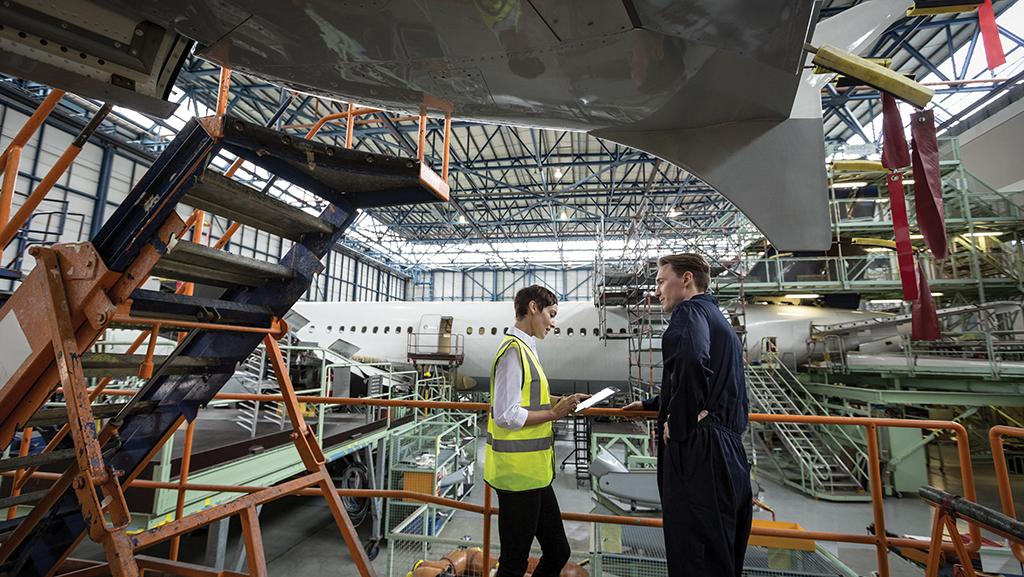Opinion: Embracing New Tech In MRO Requires Standardization Efforts

A Consumer Affairs study found that more than a third of older generations feel overwhelmed by new technologies.
Last week, my 15-year-old daughter got an A in her summer school computer coding class. That same day, my dad called me to seek help reinstalling “the app to look things up,” which turned out to be Google Chrome.
Various studies have examined how different generations utilize technology. A Pew Research study conducted just before the pandemic said 93% of Millennials (those born between 1981-93) owned smartphones, compared with 90% of Gen Xers (born 1965-80), 68% of Baby Boomers (born 1946-64) and 40% of the Silent Generation (born 1921-45).
“Baby Boomers continue to trail both Gen Xers and Millennials on most measures of technology adoption, but adoption rates for this group have been growing rapidly in recent years,” the Pew report stated.
To be clear, not all Boomers have been slow to adopt technology. Many were on the bleeding edge of the tech revolution in the 1980s and 1990s, both developing systems we use today and introducing computers into the home. But at this point in their lives, many are reluctant to adopt new technologies.
If you are over 50 and harried by the pace of technological change, you are not alone. Roughly 91% of Gen Xers and Baby Boomers participating in a Consumer Affairs study released this summer said technology has made them feel overwhelmed, with more than a third (38%) saying they feel “tech-induced overwhelm” on a daily basis.
Demographics and generational attitudes likely have much to do with why the Boomer-dominated maintenance industry has been slow to digitize. A recent Oliver Wyman report found that as much as 35% of the maintenance workforce is 55-64 years old and that one-third of the industry’s technicians are at or near retirement. “Today, most aircraft mechanics are over 40 years old, with the percentage between 18 and 30 in the single digits,” the report stated.
In recent years, the technician shortage has underscored the need for our industry to diversify in terms of race, gender and age. That ongoing diversification—particularly the recruitment of young people—will accelerate the introduction and adoption of new technologies in aviation maintenance. This, in turn, promises to increase productivity and generate information that will make our remarkably safe industry even safer. Just one example is predictive maintenance, which should improve awareness of when and whether work needs to be performed and components need to be replaced.
But realizing those benefits will require standardization. As one speaker at the recent FAA-European Union Aviation Safety Agency (EASA) International Safety Conference in Cologne, Germany, aptly said, “we can’t afford to have 20 different types of plugs”—referring to the proliferation of different electrical outlets throughout Europe. The new technologies must also fit within the aviation regulatory framework as it applies to recordkeeping, technical data availability and more.
Regulators and industry trade groups are working together via the Maintenance Management Team (MMT) to gain a better understanding of the state of technology in the maintenance sector. The MMT is a coordinating body made up of four of the world’s leading aviation authorities: the FAA, EASA, Transport Canada and Brazil’s Agencia Nacional de Aviacao Civil. Via the MMT, organizations like ARSA interface with other international stakeholder groups and regulators.
The MMT’s Digitization Working Group—which includes ARSA, the General Aviation Manufacturers Association, the International Air Transportation Association, the Modification and Replacement Parts Association and others—is developing a joint survey for their association members to provide feedback on how they gather, use, store and transmit electronic information for regulatory compliance. In particular, the survey, which will take place this fall, will examine how repair stations, manufacturers, operators and others use digital signatures, records and manuals. The survey results will be shared with regulators with the goal of standardizing these digital practices on a global basis. We also hope to identify best practices that will help build confidence in the new technologies and ease their introduction.
Our industry is changing rapidly. Whether you’re a Boomer, Gen-Xer, Millennial or member of Gen Z just entering the industry, chances are in five years you will be working with different technology than you are today. Change is scary, but often yields unforeseeable benefits. We should embrace the new technology, but we also should be smart about it: In other words, coordinating to standardize and avoid the temptation to quickly adopt new rules in areas like recordkeeping when the old ones still work just as well.
Christian A. Klein is the managing member of Obadal, Filler, MacLeod & Klein, P.L.C. overseeing the firm’s policy advocacy practice. He represents trade associations as a registered federal lobbyist and provides strategic communications and legal counsel services to clients. He is executive vice president of the Aeronautical Repair Station Association.




